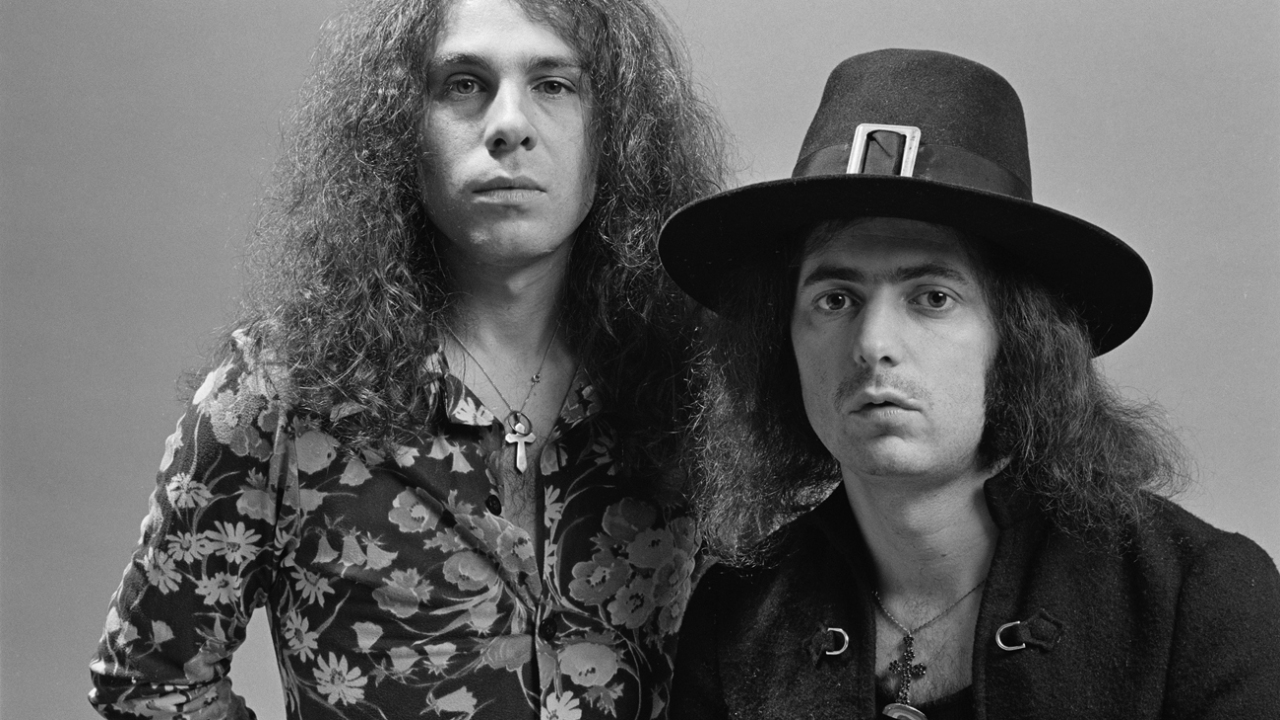"I shall do interviews initially, to get the band on its feet... but as soon as I've done that I shall revert to the mean, moody bastard I used to be."
The corners of Ritchie Blackmore’s lips curl up slowly and he smirks as he enjoys his own peculiar brand of dark humour. But it lasts for only an instant. Soon enough, his face takes on a sullen, morose aspect again and his mouth droops down.
Sitting next to Blackmore is Ronnie James Dio, singer with the new band, Rainbow. Dio also smiles, but wistfully. Perhaps in awe of his new employer, the notorious Man In Black, he doesn’t say a lot.
It’s July 1975. Blackmore is slumped on a couch in the lobby of London’s Swiss Cottage Holiday Inn. Dio is perched upright on a chair next to his leader, looking bright-eyed and bushy-tailed but ever so slightly shy. A long way from the commanding, golden-tonsilled, flared-sleeved, Maloik-gesturing Metal Leviathan he would become.
Blackmore is talking about his post-Deep Purple album, Ritchie Blackmore’s Rainbow, which is due for release the following month; on August 10, to be precise. Turns out it all began with an ancient Quatermass song called Black Sheep Of The Family.
“Yeah, it started with that song,” Blackmore confirms. “I wanted to do the number with Purple, so I said to them: ‘Hey, look, this is a great song, let’s do it on an album.’ But they weren’t too keen because it wasn’t an original track; it hadn’t been written by one of the band. But I really wanted to get it put down in one way or another, so I went into the studio with some session people and asked Ronnie to sing.”
“I was just knocked out,” chirps Dio.
Blackmore glowers with Evil Eyes. It’s his band, his interview. Dio dutifully keeps his trap shut from here on in.
Fast-forward to January 1976. It’s been a matter of the merest months, but even now the original Rainbow publicity shots are stacked in useless piles; already your just slightly scratched, only marginally over-played copy of Rainbow’s debut is outdated.
Gary Driscoll, you see, has made way for Cozy Powell. Craig Gruber’s place has gone to Jimmy Bain. And for Mickey Lee Soule, now read Tony Carey. Once again, Blackmore has moved on. He’s kicked out most of Elf – the band that became Rainbow – to further his own ends. Tellingly, only Dio has survived the cull.
I’m ensconced in Munich’s snowbound Arabella hotel, conveniently sited above Musicland studios, which is fast becoming a veritable European recording Mecca. Rainbow are in Germany rehearsing, preparing to lay down their second album, Rising, in a few days’ time.
I meet up with Blackmore and Dio again in the former’s hotel suite. Medieval music of Ritchie’s own choosing, full of lute, harpsichord and suchlike, is filtering through modest speakers as we talk about the past, present and future.
As soon as the interview commences it becomes apparent that Dio is more his own man. He has plainly learned from The Master. I ask Ronnie if he feels saddened about Blackmore’s dismantling of Elf to form Rainbow Mk II. “We dearly wanted to rise with Rainbow together,” says Dio, using the kind of bombastic language that would become his trademark. “It was only when I saw myself progressing and the rest of them standing still, then gradually falling by the wayside, that I realised Elf had finished. It was a problem. It was sad. It was like cutting off a part of myself as opposed to just breaking up a band.
“But the joy of it was knowing that everything was going to be better for me. You have to think of yourself at some point. That offset the sadness a lot.”
Sympathetic yet steely. Humble yet stubborn. Quietly spoken yet assertive. In six short months Dio has emerged from his shell. The pertinacious glint in his eyes hints of golden years ahead.
The following year, 1977, I’m in Germany again, on tour with Rainbow. My abiding memory of Dio is seeing him own the stage at Berlin’s Deutschlandhalle. More than most strutting, chest-beating vocalists, Dio came across very much as a genuine human being. He had a bona-fide affinity with the audience and really didn’t pay much attention to the ‘traditional’ role of the heavy rock frontman at all.
Dio spent much of the time standing stock-still in front of his mic stand, fingers caressing the microphone ever so gently, ever so slightly sensually. Sure, he twirled the stand around every now and again, and gave a few token peace-sign salutes – the Maloik not quite perfected yet. But the overall mood was an honest, unaffected one. As, indeed, it ever was. And then, of course, there was The Voice. A throat born of thunder. We shall never hear its like again. Dio may be dead but his hearty, heartfelt exhortation – ‘Long live rock’n’roll roll!’ – echoes still.

